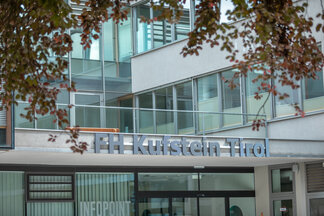Explore the possibilities of digital transformation with our part-time master's program in Corporate Transformation Management. Launch your career as an expert in change management and innovative strategy implementation.

Corporate Transformation Management
Master's degree program
Overview
-
Qualification Level:
Stufe 2, Master -
Price:
Euro 363,36* (excl. Student Union-fees) each semester -
Academic Degree:
Master of Arts in Business (MA) -
Academic Program:
Part-time -
Language:
79 % German, 21 % English -
Remote Options:
E-Learning max. 50 % online -
Exchange Semester:
Supervised one-week study trip abroad in the 4th semester** -
Admission Requirements:
General admission requirements -
Study Places per Year:
18
Study program accredited by the Agency for Quality Assurance and Accreditation Austria

Program Description



The Master's program in Corporate Transformation Management at the University of Applied Sciences Kufstein Tirol prepares you for the challenges and strategies of corporate transformation. It combines management skills with digital innovation, equipping you for leadership roles in business.
The program focuses on the development and implementation of business transformation strategies that incorporate digital technologies and regulatory frameworks. Students gain expertise in digitalization, reorganization and strategic management, supported by practical projects and case studies. Its interdisciplinary approach and blend of theory and practice prepares graduates for complex roles in various industries, providing innovative solutions and sustainable business management skills.
Study Focus
-
40 %
Social and methodological skills
-
25 %
Digital transformation & reorganization
-
14 %
Company restructuring
-
11 %
Restructuring & Law
-
10 %
Decision making
What You Will Learn
-
Developing transformation strategies
-
Integrating digital innovations
-
Developing digital business models
-
Applying agile methods
-
Strengthening leadership skills
-
Crisis management and reorganization strategies
-
Mastering change management techniques
-
Data analysis for decision making
Popular Occupational Fields
- Business Development
- Controlling
- Interim management
- Management & executives
- Strategy and restructuring advice
- Chief Restructuring Officer (CRO) & Transformation Management
- Management consulting
Career Opportunities
-
11th and 16th place
for Austria and Germany, the Digital Economy and Society Index (DESI) in the area of human capital shows an acute need for good digital skills in the workforce (European Commission).
-
3.4 trillion US dollars
will be the global expenditure on digital technologies and services in 2026 (Statista)
-
approx. 64% of companies in Germany
have a shortage of skilled workers to implement digitization (Statista)
-
20,000 jobs.
could be created in Germany each year through digitization (Accenture)
-
35% of companies in the DACH region
want to develop new business models in the future (Staufen)
-
Every 5th company in Germany
employs a CDO (Chief Digital Officer) (bitkom)
The path to the Master's degree

The master's program in Corporate Transformation Management offers deep insights into the art of corporate transformation and management. With a strong focus on digital transformation and sustainable management strategies, the program prepares students for leadership roles in business. Each semester covers different phases of a company's life cycle, from startup to development to turnaround.
Special features:
-
Specialization in digital transformation
-
Expert lectures from business practice
-
Interdisciplinary case studies
Recognition of Prior Learning
Students have the option to receive credit for skills and competencies they have already acquired before the start of each semester.
To apply for credit, they must submit a request directly to the Director of Studies.
Director of Studies

Prof. (FH) DDr. Mario Situm, MBA
Director of Studies Bachelor Leadership & Business Management, Business Psychology & Management | Master Corporate Transformation Management
Curriculum
Fundamentals:
• 4 development stages of business analytics (descriptive analytics, diagnostic analytics, predictive analytics, prescrip-tive analytics)
• Change of control processes (reactive-analytical vs. proactive-forecasting; agile, real-time and based on data analy-sis; fact-based, differentiated and fast; cross-company and cross-value-added)
• Changing business modeling framework (highly trained specialists; changing roles, organizations, and profiles; infor-mation processes and quality of decisions; use of internal and external data; consistent governance)
Analysis methods:
• Structural testing analysis methods (regression analysis [linear, non-linear, logistic, exponential, etc.], time series analysis, variance/covariance analysis, discriminant analysis, contingency analysis, structural equation analysis, con-joint analyses)
• Structural discovery analysis methods (factor analysis, cluster analysis, neural networks, multidimensional scaling, correspondence analysis, data envelopment analysis)
Business Analytics Process:
• Problem identification (identification of the need for action, delineation of issues, formulation of tasks)
• Exploration (data acquisition, data mining)
• Optimization (determination of implementation hurdles and costs, planning and budgeting, development of optimiza-tion concept)
• Monitoring (monitoring effectiveness, setting up a monitoring system, defining key performance indicators)
I. Basics:
• Differentiation of quantitative from qualitative research
• Empirical data and distributions of data (discrete vs. continuous distribution, distribution functions, visualization of distributions, etc.)
• Data search and creation of a database for software-based analysis
II. Descriptive Statistics:
• Definition and calculation of selected statistical parameters (mean, median, maximum, minimum, variance, standard deviation, etc.)
• Measures of correlation between several series of measurements (covariance, correlation)
• Dealing with outliers in data
III. Closing statistics:
• Tests for differences (ANOVA, t-test, U-test, H-test etc.)
• Supplementary correlation analysis (factor analysis, principal component analysis)
IV. Questionnaire design and scale evaluation
• Application of scales and development of a questionnaire
• Implementation of a pre-test
• Development of constructs
• Confirmatory factor analysis and Cronbach's alpha
V. Selected statistical techniques
• Univariate and multivariate regression analysis
• Multivariate linear discriminant analysis
• Logistic regression
I. Basics:
• Definition of start-up and phases in start-up management
• Definition of strategy and differentiation from business model
II. Start-up management:
- Growth hacking vs. growth management
• Customer success management
• Aligning organizational structure with strategy
• Tools & techniques in start-up management
• Building and maintaining networks
III. Strategic approaches:
• Classic strategy approaches (differentiation, cost leadership, niche strategy, etc.)
• Modern strategy approaches (Agile Transformation, Product-Market-Fit, AB-Testing, Growth by Engineering, etc.)
• Tools and techniques of (digital) strategy development for start-up companies
I. Basics
• Definition of innovation and turnaround
• Current state of research of innovation in turnaround management
• Hurdles of innovation in turnaround situations (thread-rigidity theory vs. innovation theory)
II. Sources of innovation
• Product innovation in turnaround management
• Process innovation in turnaround management
• Marketing innovation in turnaround management
• Organizational innovation in turnaround management
III. Strategy and innovation in turnaround
• Innovation strategies in turnaround management
• Success of innovation in turnaround situations
I. Basics:
• Definition Management vs Leadership
• Definition Entrepreneurship
II. Leadership
• Classical leadership styles (Managerial Grid, MbO approaches etc.)
• Modern leadership styles (Distributed Leadership, Inspirational Leadership, Leadership & Artificial Intelligence etc.)
• Disruption and challenges in leadership
III. Entrepreneurship
• Entrepreneurial Design vs. Business Model
• Digital Entrepreneurship
• Challenges of Entrepreneurship
• Tools and Techniques in Entrepreneurship
• Selected tools for business model development in transformation processes
• Hierarchy-independent selection of employees and external experts
• Structured implementation of the business model development project
• Implementation of the testing phase on the market or at the customer
• Basics of project coordination using modern management tools
• Establishment of a project monitoring incl. reporting system
• Definition of innovation and types of innovation
• Integrated process model for innovation and product management
• The innovation dilemma
• Critical factors of innovation success
• Idea management, creativity and open innovation
• Systematic product concept development (market and competitor analysis, concept definition, concept evaluation, quality function deployment)
• New product development (Ansoff matrix of growth, the V-model, reasons for misdevelopment, agile new product development)
• Idea development (strategy development, infrastructure, copycats)
• Tools and techniques of idea generation (competence analysis, scenario technique, search field analysis, creativity techniques, expert interviews, scoring model, profitability analysis)
• Business plan creation
• Basics and overview (projects and project management, role of project management, PM approach clas-sic/agile/hybrid)
• Project initiation and planning (project start, project goals, project organization, phases, milestones, work breakdown structure (WBS), stakeholder analysis, risk analysis, use of modern project management techniques)
• Project control (project controlling, project status reporting, milestone trend analysis)
• Project closure (lessons learned, project closure report)
• Success factors for project management (overview of success factors, project crises and conflicts, teamwork and communication)
I. The term crisis and the analysis via key figures
1. The recognition of a crisis
• financial accounting and annual financial statements
• performance and control variables
• reorganization and over-indebtedness audit
• crisis stages and reorganization expert opinions
2. "Crisis cockpit" and crisis indicators
• Capital structure, asset and earnings analysis
• Financial ratios with adjusted data
• Financial and performance crisis indicators
• Case study: Early Crisis Detection
II. Strategic early warning systems
• Recognizing a strategic crisis
• Group discussion: Development of solution proposals
The Management Talk course aims at inviting guest professors from Austria and abroad (partner network FH Kufstein Tirol) on the subject areas of transformation and turnaround management, with special consideration for international standards.
• Margin cost accounting
• Target costing
• Activity-based costing
• Legal and economic requirements for risk management systems
• Identification of risks
• Methods for quantifying risks
• Types of risk measures
• Methods of risk aggregation and determination
• Organizational design of risk management systems
• Risk management and transfer
• Risk management & rating
• Risk management as an integral part of corporate management
• Determination of capital cost approaches for value-oriented corporate management
Part A - Forecasting Methods:
• Overview of different forecasting methods
• Simple quantitative methods (especially time series analysis and causal methods, e.g. trend extrapolation or linear regression)
• Qualitative methods (e.g. Delphi method)
Part B - Scenario techniques:
• Overview of different scenario techniques
• Application options and examples
• Phases of a transaction (initial contact, mandate, preparation of exposé, company valuation, search for buyer or seller, letter of intent, due diligence, contract negotiations and closing)
• Special features of distressed M&A (asset deal and share deal)
• Capital Asset Pricing Model (CAPM)
• Determining cost of capital with the WACC approach
• Overview of business valuation methods
• Valuation of companies using the capitalized earnings value method, the DCF approach and the use of multiples
• Price setting in practice: Buyer and seller perspective
The Management Talk course aims at inviting guest professors from Austria and abroad (partner network FH Kufstein Tirol) on the subject areas of transformation and turnaround management, with special consideration for international standards.
• Budgeting
• Working Capital Management
• Financial and Performance Indicators (KPIs)
• Consideration based on different accounting standards
I. Restructuring within the individual functional areas
• Purchasing
• Production
• Construction
• Logistics
• Sales
• Human Resources
• Accounting
• Research & Development
II. Negotiations with creditors taking into account different partial interests
• Credit institutions and trade credit insurers
• Suppliers
• Social insurance agencies and tax authorities
I. Fundamentals of Corporate Finance
II. Fundamentals of Restructuring Financing
III. Financial restructuring measures in the area of debt capital
• Waiver of loan termination
• Standstill agreement
• Conversion of existing liabilities
- Declaration of subordination, debt-equity swap
• Reduction or waiver of existing liabilities
- Waiver of claims
• Injection of new debt capital
- Restructuring loan
IV. Special forms of restructuring financing (mezzanine loan incl. participating loan, typical and atypical dormant part-nership, debtor-in-possession capital, profit participation rights, convertible bonds)
V. Other financial restructuring measures
• Book-based equity restructuring
• Subsidies and capital increases
• Shareholder loans
• Turnaround equity Financial restructuring measures in the area of assets (sale of non-operating assets; factoring & forfeiting)
• basic knowledge of forecasting and its active application in practice
• building up of an integrated planning and control system (PAC) taking into account the corporate strategy
• limits of budgeting and alternative concepts (better, advanced, beyond budgeting, modern budgeting)
• instruments of analysis (target/actual comparison) in controlling • building up of reporting and essential design elements in reporting as a basis for control decisions
• data preparation and visualization to different addressees
The Management Talk course aims at inviting guest professors from Austria and abroad (partner network FH Kufstein Tirol) on the subject areas of transformation and turnaround management, with special consideration for international standards.
• Value Chain Analysis
• Human Resources
• Research & Development
The Management Talk course aims at inviting guest professors from Austria and abroad (partner network FH Kufstein Tirol) on the subject areas of transformation and turnaround management, with special consideration for international standards.
• Distinction between interim management and restructuring consulting
• Requirements profile of interim management
• Role expectations and project procedure
• Quality assurance and remuneration
I. Basics:
• Difference between qualitative and quantitative research
• Limitations of quantitative research
• Relevance of qualitative research
• Theoretical framework (positivism, constructivism, construction of knowledge, symbolic interactionism, ethnometh-odology, structuralist model, etc.)
• Types of data
• Texts and reality
II. Research design
• formulation of research questions and hypotheses
• selection and construction of research design
• planning the research process in qualitative research
• analysis of existing literature
• selection of sample/experts
III. Qualitative data analysis
• transcription and data management
• coding according to Grounded Theory
• use of software in qualitative content analysis
• presentation of results, objectification and discussion of results
Within the course, projects are worked on for and with a project partner from business, association, science or politics. In this, the participating students are to work on a comprehensive problem in order to deepen their knowledge in accordance with the course content of the degree program. The students are fully responsible for the elaboration and solution of the problem. A specification of the project contents will be worked out in advance by the project partners. As a rule, the students prepare a presentation with corresponding recommendations for action. The results are usually presented in a presentation to the decision-makers, sometimes also to and with the entire staff.
Within the course, projects are worked on for and with a project partner from business, association, science or politics. In this, the participating students are to work on a comprehensive problem in order to deepen their knowledge in accordance with the course contents of the degree program. The students are fully responsible for the elaboration and solution of the problem. A specification of the project contents will be worked out in advance by the project partners. As a rule, the students prepare a presentation with corresponding recommendations for action. The results are usually presented in a presentation to the decision-makers, sometimes also to and with the entire staff.
The 5-day stay serves to deepen and complement the topics of transformation and turnaround management covered in the course content. Together with decision-makers from SMEs, corporate groups, restructuring consultancies, insolvency administrations and credit institutions, the applied tools in connection with change processes in companies will be presented and discussed. In addition, there is an expansion and deepening of individual competencies.
The aim of the course is to ensure the students' reflection during the period of working on the Master thesis, in particu-lar practicing defending and presenting academic topics as well as shaping discussions and conducting discourse.
Independent development and elaboration of an interdisciplinary subject area in the field of transformation and turna-round using scientific methods. Ideally, there is a synthesis of business-related, transformational and legal problems and solution approaches.
• Overview of company forms (natural and legal persons)
• Basics of company law (legal bases in Germany and Austria)
• Legal options for increasing or reducing capital
• Capital maintenance regulations & return of contributions
• Sale of companies & M&A
• Overview of IT law areas
• Legal requirements of data protection and implementation in companies
• Telecommunications Act and DSGVO
• Special areas of IT law in digitalization and reorganization projects
• IT-relevant issues in corporate transactions
• Basics of Human Resource Management (definition, organization, terms etc.) with special consideration of change processes
• Employer Journey (recruiting, employee development, employee retention, outplacement etc.) in the transformation process
• General labor law (establishment, amendment, termination of employment relationships)
• Company (partial) transitions
• Company (partial) closures
• Other reorganization measures
• Workshop/Case Study
• Insolvency development and causes of insolvency
• Corporate restructuring
• Restructuring law
• Measures for out-of-court corporate restructuring
• Types of corporate crises
• Overview of the applicable insolvency system
• Basic features of liability law
• Transferable restructuring
• Creditors affected by restructuring
• Risks of failed restructuring
• Equity Substituting Capital Act (EKEG) and prohibited return of capital contributions
Case-based integration of the following subject areas:
• Balance sheet structure analysis
• Strengths and weaknesses analysis restructuring ability
• Liquidity and financial requirements creditor discussions
• Emergency program to generate liquidity
• Project management and allocation of responsibilities
• Operational immediate measures restructuring concept
• Financial and performance-related restructuring measures liquidity management
• Organizational change
• Management structure and management staffing restructuring balance sheets
• Restructuring program disposal of parts of the company Disposal of the entire company
• Different approaches of applied restructuring appraisals
• Restructuring ability & worthiness
• Structure of a restructuring appraisal (description of the crisis stage, sustainability of the business model, integrated planning, planned restructuring measures etc.)
• Special features of liability law from the expert's point of view
• Controlling of the implementation measures
• Basics of change management (definition, framework conditions for change, basic forms of change)
• Kotter's phase model
• Organization of change projects
• Building up a management coalition and the importance of communication
• Dealing with resistance
• Interplay between factual and emotional levels
• Working out success factors
• Early recognition and early disclosure - the role of the media
• Systemic analysis within the communication strategy
• Stakeholder analysis and communication requirements of different stakeholders
• Creditor communication as a specific challenge
• Reputation management as a core task of strategic communication
• Principles of crisis communication
• Essential theoretical foundations of the PR concept Transformation situations
• Learning tools and methods for successful communication in restructuring and transformation situations
• Mechanisms and modes of action of the media, taking into account the importance of digital media
• Working through case studies
• Industry 4.0 and Industrial Internet of Things
• Cloud solutions
• Computer Integrated Manufacturing (CIM): CAD,-CAM and ERP/PPS systems
• Smart Factory & Smart Technologies (Smart Home, Smart Room, Smart City)
• Wearables
• Wireless Technology
• Human Machine Interface (Counter Control, Voice Assistant, Eye Tracking, Skin Tracking, Thermal Touch, Projected User Interfaces)
• 3D and Augmented Reality (AR glasses, Google Glass, Microsoft HoloLens)
• Virtual Reality & Second Life
• Apps
• Types of analog and digital workflows and their specific uses
• Definition of relevant digitization fields
• Development of a digitization strategy
• Further development into a digital business model (incremental digital optimization of existing business models, business model innovation)
• Options for raising capital in start-up situations
• Overview of different exit strategies of investors (e.g. IPO, buy-out, secondary buy-out, trade sale, etc.)
• Fundamentals of contract law peculiarities and liability risks
• Fundamentals of capital market law
• Start-up as a strategic add-on for corporates
I. Basics:
• Definition of start-up and phases in start-up management
• Definition of strategy and differentiation from business model
II. Start-up management:
- Growth hacking vs. growth management
• Customer success management
• Aligning organizational structure with strategy
• Tools & techniques in start-up management
• Building and maintaining networks
III. Strategic approaches:
• Classic strategy approaches (differentiation, cost leadership, niche strategy, etc.)
• Modern strategy approaches (Agile Transformation, Product-Market-Fit, AB-Testing, Growth by Engineering, etc.)
• Tools and techniques of (digital) strategy development for start-up companies
I. Basics:
• Definition Management vs Leadership
• Definition Entrepreneurship
II. Leadership
• Classical leadership styles (Managerial Grid, MbO approaches etc.)
• Modern leadership styles (Distributed Leadership, Inspirational Leadership, Leadership & Artificial Intelligence etc.)
• Disruption and challenges in leadership
III. Entrepreneurship
• Entrepreneurial Design vs. Business Model
• Digital Entrepreneurship
• Challenges of Entrepreneurship
• Tools and Techniques in Entrepreneurship
• Selected tools for business model development in transformation processes
• Hierarchy-independent selection of employees and external experts
• Structured implementation of the business model development project
• Implementation of the testing phase on the market or at the customer
• Basics of project coordination using modern management tools
• Establishment of a project monitoring incl. reporting system
• Definition of innovation and types of innovation
• Integrated process model for innovation and product management
• The innovation dilemma
• Critical factors of innovation success
• Idea management, creativity and open innovation
• Systematic product concept development (market and competitor analysis, concept definition, concept evaluation, quality function deployment)
• New product development (Ansoff matrix of growth, the V-model, reasons for misdevelopment, agile new product development)
• Idea development (strategy development, infrastructure, copycats)
• Tools and techniques of idea generation (competence analysis, scenario technique, search field analysis, creativity techniques, expert interviews, scoring model, profitability analysis)
• Business plan creation
• Basics and overview (projects and project management, role of project management, PM approach clas-sic/agile/hybrid)
• Project initiation and planning (project start, project goals, project organization, phases, milestones, work breakdown structure (WBS), stakeholder analysis, risk analysis, use of modern project management techniques)
• Project control (project controlling, project status reporting, milestone trend analysis)
• Project closure (lessons learned, project closure report)
• Success factors for project management (overview of success factors, project crises and conflicts, teamwork and communication)
I. The term crisis and the analysis via key figures
1. The recognition of a crisis
• financial accounting and annual financial statements
• performance and control variables
• reorganization and over-indebtedness audit
• crisis stages and reorganization expert opinions
2. "Crisis cockpit" and crisis indicators
• Capital structure, asset and earnings analysis
• Financial ratios with adjusted data
• Financial and performance crisis indicators
• Case study: Early Crisis Detection
II. Strategic early warning systems
• Recognizing a strategic crisis
• Group discussion: Development of solution proposals
The Management Talk course aims at inviting guest professors from Austria and abroad (partner network FH Kufstein Tirol) on the subject areas of transformation and turnaround management, with special consideration for international standards.
• Margin cost accounting
• Target costing
• Activity-based costing
• Overview of company forms (natural and legal persons)
• Basics of company law (legal bases in Germany and Austria)
• Legal options for increasing or reducing capital
• Capital maintenance regulations & return of contributions
• Sale of companies & M&A
• Overview of IT law areas
• Legal requirements of data protection and implementation in companies
• Telecommunications Act and DSGVO
• Special areas of IT law in digitalization and reorganization projects
• IT-relevant issues in corporate transactions
• Industry 4.0 and Industrial Internet of Things
• Cloud solutions
• Computer Integrated Manufacturing (CIM): CAD,-CAM and ERP/PPS systems
• Smart Factory & Smart Technologies (Smart Home, Smart Room, Smart City)
• Wearables
• Wireless Technology
• Human Machine Interface (Counter Control, Voice Assistant, Eye Tracking, Skin Tracking, Thermal Touch, Projected User Interfaces)
• 3D and Augmented Reality (AR glasses, Google Glass, Microsoft HoloLens)
• Virtual Reality & Second Life
• Apps
• Types of analog and digital workflows and their specific uses
• Definition of relevant digitization fields
• Development of a digitization strategy
• Further development into a digital business model (incremental digital optimization of existing business models, business model innovation)
• Options for raising capital in start-up situations
• Overview of different exit strategies of investors (e.g. IPO, buy-out, secondary buy-out, trade sale, etc.)
• Fundamentals of contract law peculiarities and liability risks
• Fundamentals of capital market law
• Start-up as a strategic add-on for corporates
Fundamentals:
• 4 development stages of business analytics (descriptive analytics, diagnostic analytics, predictive analytics, prescrip-tive analytics)
• Change of control processes (reactive-analytical vs. proactive-forecasting; agile, real-time and based on data analy-sis; fact-based, differentiated and fast; cross-company and cross-value-added)
• Changing business modeling framework (highly trained specialists; changing roles, organizations, and profiles; infor-mation processes and quality of decisions; use of internal and external data; consistent governance)
Analysis methods:
• Structural testing analysis methods (regression analysis [linear, non-linear, logistic, exponential, etc.], time series analysis, variance/covariance analysis, discriminant analysis, contingency analysis, structural equation analysis, con-joint analyses)
• Structural discovery analysis methods (factor analysis, cluster analysis, neural networks, multidimensional scaling, correspondence analysis, data envelopment analysis)
Business Analytics Process:
• Problem identification (identification of the need for action, delineation of issues, formulation of tasks)
• Exploration (data acquisition, data mining)
• Optimization (determination of implementation hurdles and costs, planning and budgeting, development of optimiza-tion concept)
• Monitoring (monitoring effectiveness, setting up a monitoring system, defining key performance indicators)
I. Basics:
• Differentiation of quantitative from qualitative research
• Empirical data and distributions of data (discrete vs. continuous distribution, distribution functions, visualization of distributions, etc.)
• Data search and creation of a database for software-based analysis
II. Descriptive Statistics:
• Definition and calculation of selected statistical parameters (mean, median, maximum, minimum, variance, standard deviation, etc.)
• Measures of correlation between several series of measurements (covariance, correlation)
• Dealing with outliers in data
III. Closing statistics:
• Tests for differences (ANOVA, t-test, U-test, H-test etc.)
• Supplementary correlation analysis (factor analysis, principal component analysis)
IV. Questionnaire design and scale evaluation
• Application of scales and development of a questionnaire
• Implementation of a pre-test
• Development of constructs
• Confirmatory factor analysis and Cronbach's alpha
V. Selected statistical techniques
• Univariate and multivariate regression analysis
• Multivariate linear discriminant analysis
• Logistic regression
• Legal and economic requirements for risk management systems
• Identification of risks
• Methods for quantifying risks
• Types of risk measures
• Methods of risk aggregation and determination
• Organizational design of risk management systems
• Risk management and transfer
• Risk management & rating
• Risk management as an integral part of corporate management
• Determination of capital cost approaches for value-oriented corporate management
Part A - Forecasting Methods:
• Overview of different forecasting methods
• Simple quantitative methods (especially time series analysis and causal methods, e.g. trend extrapolation or linear regression)
• Qualitative methods (e.g. Delphi method)
Part B - Scenario techniques:
• Overview of different scenario techniques
• Application options and examples
• Phases of a transaction (initial contact, mandate, preparation of exposé, company valuation, search for buyer or seller, letter of intent, due diligence, contract negotiations and closing)
• Special features of distressed M&A (asset deal and share deal)
• Capital Asset Pricing Model (CAPM)
• Determining cost of capital with the WACC approach
• Overview of business valuation methods
• Valuation of companies using the capitalized earnings value method, the DCF approach and the use of multiples
• Price setting in practice: Buyer and seller perspective
The Management Talk course aims at inviting guest professors from Austria and abroad (partner network FH Kufstein Tirol) on the subject areas of transformation and turnaround management, with special consideration for international standards.
• Budgeting
• Working Capital Management
• Financial and Performance Indicators (KPIs)
• Consideration based on different accounting standards
Within the course, projects are worked on for and with a project partner from business, association, science or politics. In this, the participating students are to work on a comprehensive problem in order to deepen their knowledge in accordance with the course content of the degree program. The students are fully responsible for the elaboration and solution of the problem. A specification of the project contents will be worked out in advance by the project partners. As a rule, the students prepare a presentation with corresponding recommendations for action. The results are usually presented in a presentation to the decision-makers, sometimes also to and with the entire staff.
• Basics of Human Resource Management (definition, organization, terms etc.) with special consideration of change processes
• Employer Journey (recruiting, employee development, employee retention, outplacement etc.) in the transformation process
• General labor law (establishment, amendment, termination of employment relationships)
• Company (partial) transitions
• Company (partial) closures
• Other reorganization measures
• Workshop/Case Study
• Basics of change management (definition, framework conditions for change, basic forms of change)
• Kotter's phase model
• Organization of change projects
• Building up a management coalition and the importance of communication
• Dealing with resistance
• Interplay between factual and emotional levels
• Working out success factors
• Early recognition and early disclosure - the role of the media
• Systemic analysis within the communication strategy
• Stakeholder analysis and communication requirements of different stakeholders
• Creditor communication as a specific challenge
• Reputation management as a core task of strategic communication
• Principles of crisis communication
• Essential theoretical foundations of the PR concept Transformation situations
• Learning tools and methods for successful communication in restructuring and transformation situations
• Mechanisms and modes of action of the media, taking into account the importance of digital media
• Working through case studies
I. Basics
• Definition of innovation and turnaround
• Current state of research of innovation in turnaround management
• Hurdles of innovation in turnaround situations (thread-rigidity theory vs. innovation theory)
II. Sources of innovation
• Product innovation in turnaround management
• Process innovation in turnaround management
• Marketing innovation in turnaround management
• Organizational innovation in turnaround management
III. Strategy and innovation in turnaround
• Innovation strategies in turnaround management
• Success of innovation in turnaround situations
I. Restructuring within the individual functional areas
• Purchasing
• Production
• Construction
• Logistics
• Sales
• Human Resources
• Accounting
• Research & Development
II. Negotiations with creditors taking into account different partial interests
• Credit institutions and trade credit insurers
• Suppliers
• Social insurance agencies and tax authorities
I. Fundamentals of Corporate Finance
II. Fundamentals of Restructuring Financing
III. Financial restructuring measures in the area of debt capital
• Waiver of loan termination
• Standstill agreement
• Conversion of existing liabilities
- Declaration of subordination, debt-equity swap
• Reduction or waiver of existing liabilities
- Waiver of claims
• Injection of new debt capital
- Restructuring loan
IV. Special forms of restructuring financing (mezzanine loan incl. participating loan, typical and atypical dormant part-nership, debtor-in-possession capital, profit participation rights, convertible bonds)
V. Other financial restructuring measures
• Book-based equity restructuring
• Subsidies and capital increases
• Shareholder loans
• Turnaround equity Financial restructuring measures in the area of assets (sale of non-operating assets; factoring & forfeiting)
• basic knowledge of forecasting and its active application in practice
• building up of an integrated planning and control system (PAC) taking into account the corporate strategy
• limits of budgeting and alternative concepts (better, advanced, beyond budgeting, modern budgeting)
• instruments of analysis (target/actual comparison) in controlling • building up of reporting and essential design elements in reporting as a basis for control decisions
• data preparation and visualization to different addressees
The Management Talk course aims at inviting guest professors from Austria and abroad (partner network FH Kufstein Tirol) on the subject areas of transformation and turnaround management, with special consideration for international standards.
• Value Chain Analysis
• Human Resources
• Research & Development
Within the course, projects are worked on for and with a project partner from business, association, science or politics. In this, the participating students are to work on a comprehensive problem in order to deepen their knowledge in accordance with the course contents of the degree program. The students are fully responsible for the elaboration and solution of the problem. A specification of the project contents will be worked out in advance by the project partners. As a rule, the students prepare a presentation with corresponding recommendations for action. The results are usually presented in a presentation to the decision-makers, sometimes also to and with the entire staff.
• Insolvency development and causes of insolvency
• Corporate restructuring
• Restructuring law
• Measures for out-of-court corporate restructuring
• Types of corporate crises
• Overview of the applicable insolvency system
• Basic features of liability law
• Transferable restructuring
• Creditors affected by restructuring
• Risks of failed restructuring
• Equity Substituting Capital Act (EKEG) and prohibited return of capital contributions
Case-based integration of the following subject areas:
• Balance sheet structure analysis
• Strengths and weaknesses analysis restructuring ability
• Liquidity and financial requirements creditor discussions
• Emergency program to generate liquidity
• Project management and allocation of responsibilities
• Operational immediate measures restructuring concept
• Financial and performance-related restructuring measures liquidity management
• Organizational change
• Management structure and management staffing restructuring balance sheets
• Restructuring program disposal of parts of the company Disposal of the entire company
• Different approaches of applied restructuring appraisals
• Restructuring ability & worthiness
• Structure of a restructuring appraisal (description of the crisis stage, sustainability of the business model, integrated planning, planned restructuring measures etc.)
• Special features of liability law from the expert's point of view
• Controlling of the implementation measures
The Management Talk course aims at inviting guest professors from Austria and abroad (partner network FH Kufstein Tirol) on the subject areas of transformation and turnaround management, with special consideration for international standards.
• Distinction between interim management and restructuring consulting
• Requirements profile of interim management
• Role expectations and project procedure
• Quality assurance and remuneration
I. Basics:
• Difference between qualitative and quantitative research
• Limitations of quantitative research
• Relevance of qualitative research
• Theoretical framework (positivism, constructivism, construction of knowledge, symbolic interactionism, ethnometh-odology, structuralist model, etc.)
• Types of data
• Texts and reality
II. Research design
• formulation of research questions and hypotheses
• selection and construction of research design
• planning the research process in qualitative research
• analysis of existing literature
• selection of sample/experts
III. Qualitative data analysis
• transcription and data management
• coding according to Grounded Theory
• use of software in qualitative content analysis
• presentation of results, objectification and discussion of results
The 5-day stay serves to deepen and complement the topics of transformation and turnaround management covered in the course content. Together with decision-makers from SMEs, corporate groups, restructuring consultancies, insolvency administrations and credit institutions, the applied tools in connection with change processes in companies will be presented and discussed. In addition, there is an expansion and deepening of individual competencies.
The aim of the course is to ensure the students' reflection during the period of working on the Master thesis, in particu-lar practicing defending and presenting academic topics as well as shaping discussions and conducting discourse.
Independent development and elaboration of an interdisciplinary subject area in the field of transformation and turna-round using scientific methods. Ideally, there is a synthesis of business-related, transformational and legal problems and solution approaches.
Study regulations to download
-
Corporate Transformation Management
in effect since June 24, 2021, start of study program from academic year 2021/22
- All study regulations
Frequently Asked Questions
Which specific management skills are taught?
Students learn core skills in change management, strategic planning, financial management and leadership ethics, enriched by practical experience and expert knowledge.
How can you learn from the experience of industry experts in the Master's program?
Regular presentations and workshops with leading industry experts offer insights into current market trends and best practices.
What practical experience do you gain during your studies?
Through projects with companies, case studies and expert workshops, students gain practical insights into real transformation processes.
Do I have to work while studying part-time?
No, there is no obligation to work or to be active in the industry. The course offers you the opportunity for further development, even if you are working in another profession or are not currently working.
Unlike a dual study program, there is no binding contract with a company. Many students also use the course during parental leave or for professional reorientation.










